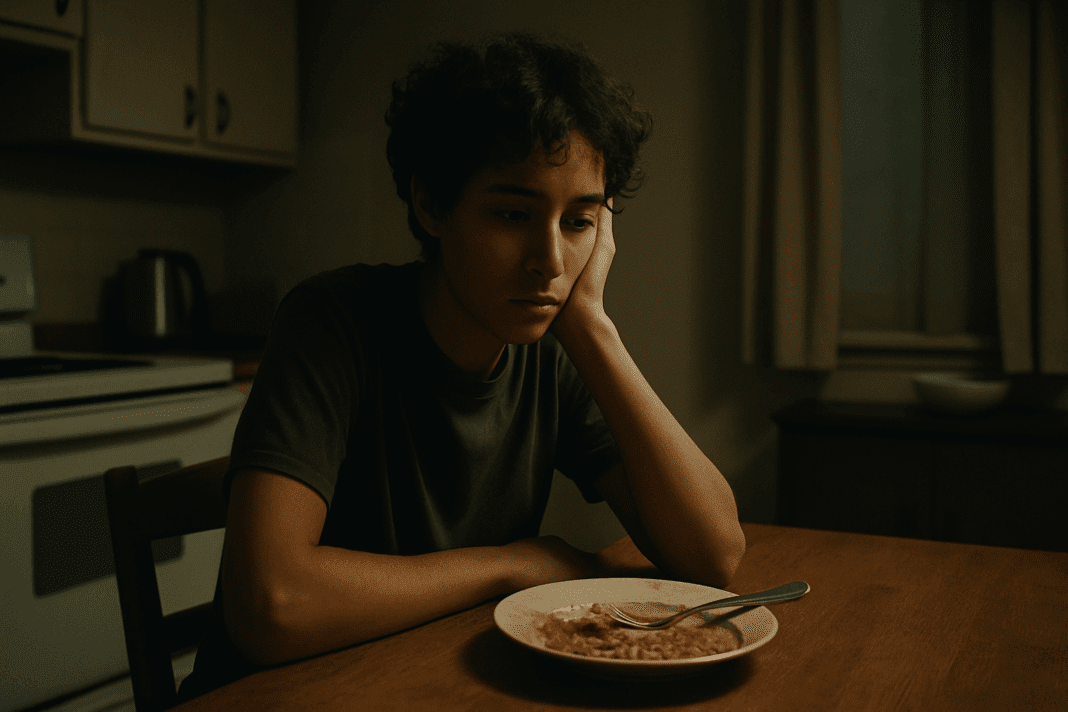Why Do I Feel Bad After I Eat? Understanding Food Guilt, Nausea, and Emotional Eating Triggers
Eating is a basic human necessity, a source of nourishment, and for many, a moment of pleasure and connection. Yet, for an increasing number of people, mealtimes are followed not by satisfaction but by a flood of negative emotions or physical discomfort. If you’ve ever asked yourself, “Why do I feel bad after I eat?” you’re far from alone. This question reflects a complex web of psychological, emotional, and physiological factors that can make eating a deeply conflicted experience. Whether it’s the overwhelming sensation of food guilt, feeling guilty after eating something deemed “unhealthy,” or struggling with sensations like nausea even when hungry, the experience is real—and it matters.
You may also like: How to Stop Emotional Eating and Regain Control: Mindful Nutrition Strategies That Support a Healthier Lifestyle
The body and brain are intricately connected, and how we eat can be influenced by more than just appetite. Cultural messaging, personal experiences, mental health conditions, and physiological responses can all contribute to the unsettling feelings that follow eating. For many, it’s not just a matter of digestion—it’s a moment of emotional reckoning. Understanding the roots of these responses is the first step toward healing your relationship with food. This article explores the causes, manifestations, and remedies for those unpleasant feelings after eating, with insights that go beyond surface-level advice. We’ll delve into the underlying issues that contribute to food guilt, nausea, and emotional triggers that complicate the act of eating.
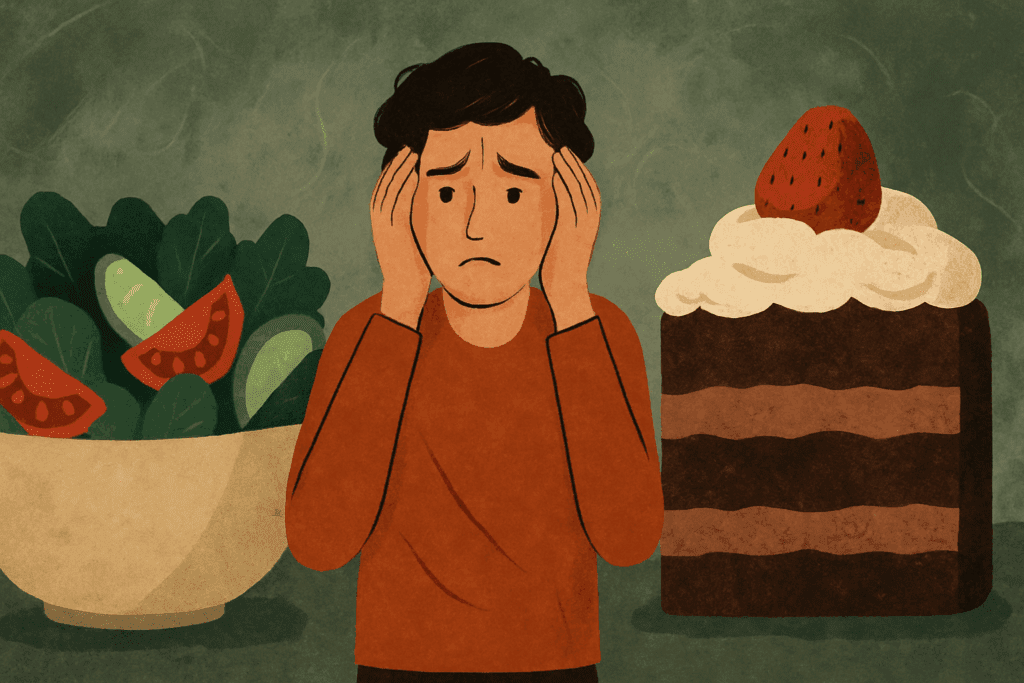
The Psychology Behind Food Guilt and Why It Persists
Food guilt is not a new phenomenon, but its pervasiveness has increased in recent decades due to shifting cultural norms and the rise of diet culture. At its core, food guilt stems from internalized beliefs that label certain foods as “good” and others as “bad.” When someone consumes a food that they’ve mentally placed in the “bad” category, they may experience shame, regret, or self-criticism. These emotional reactions are not always logical; they are deeply rooted in learned behaviors and societal conditioning.
A common reason people feel guilty after eating is because they have associated their self-worth with dietary choices. The messaging from influencers, wellness programs, and even medical professionals can reinforce the idea that being disciplined around food is synonymous with being morally superior or more health-conscious. As a result, deviating from these expectations—even slightly—can trigger a disproportionate emotional response. Feeling guilty after eating a dessert, fast food, or even an extra portion of a home-cooked meal can create a cycle of self-blame and restriction that becomes hard to break.
Complicating matters further is the role of perfectionism and black-and-white thinking. Many people believe that unless their diet is “perfect,” they are failing. This all-or-nothing mentality sets the stage for guilt whenever eating strays from that unrealistic ideal. Moreover, food guilt often goes beyond the moment—it can color someone’s perception of themselves long after the meal is over. This lingering sense of failure may lead to compensatory behaviors like skipping the next meal, overexercising, or obsessively tracking calories, which only deepen the emotional rift between the individual and food.
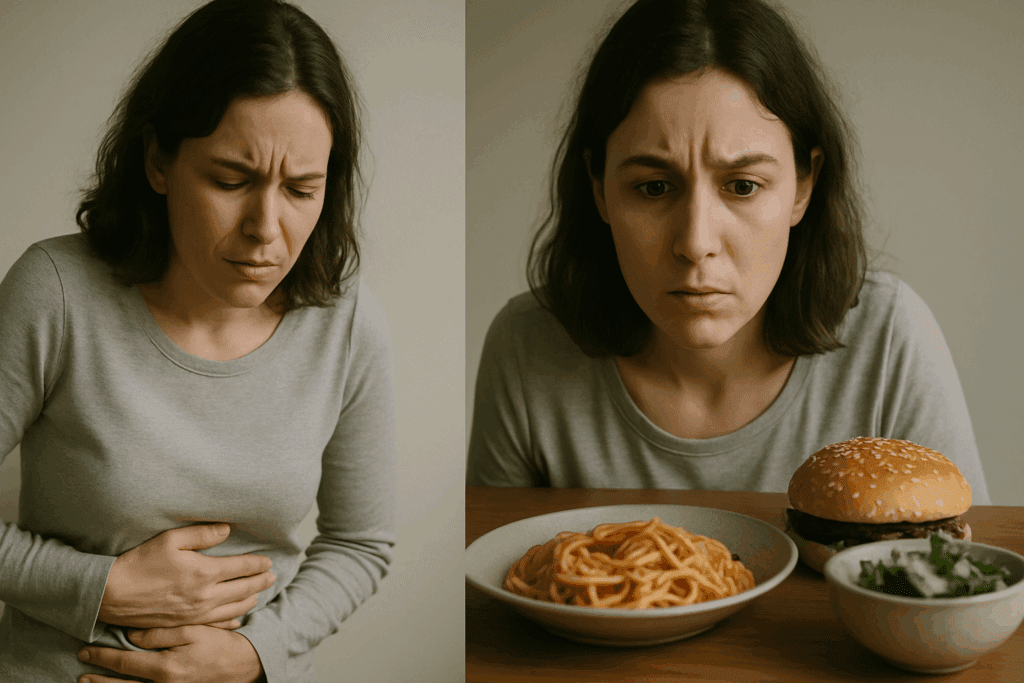
When Hunger and Nausea Collide: A Confusing Physical Response
One of the more physically disorienting experiences people report is feeling hungry but nauseous when they try to eat. This seemingly contradictory reaction can be distressing, especially when it happens frequently. While it may appear paradoxical, this phenomenon often has an understandable basis in the body’s stress response. When the brain perceives danger or distress—whether real or psychological—it activates the sympathetic nervous system, commonly known as the fight-or-flight response. This causes digestion to slow down, as the body redirects energy away from non-essential functions in moments of perceived threat.
So, why do some individuals feel hungry but feel like throwing up when they eat? Stress, anxiety, and unresolved emotional tension can all play a role. For people who have a history of disordered eating or food-related trauma, mealtimes themselves may trigger anxiety. This emotional arousal can inhibit the digestive system and lead to symptoms such as nausea, bloating, or even vomiting. Additionally, gastrointestinal conditions like gastritis, acid reflux, or gastroparesis can create similar symptoms, though they originate from physical imbalances rather than psychological distress.
It’s also worth noting that irregular eating patterns—such as skipping meals or following overly restrictive diets—can exacerbate these symptoms. When the body is deprived of consistent nourishment, it may respond with confusion. The individual might feel ravenous yet physically unable to consume food, creating a feedback loop of discomfort and fear. Addressing both the physiological and emotional dimensions of this experience is essential to breaking the cycle and fostering a healthier, more intuitive relationship with food.
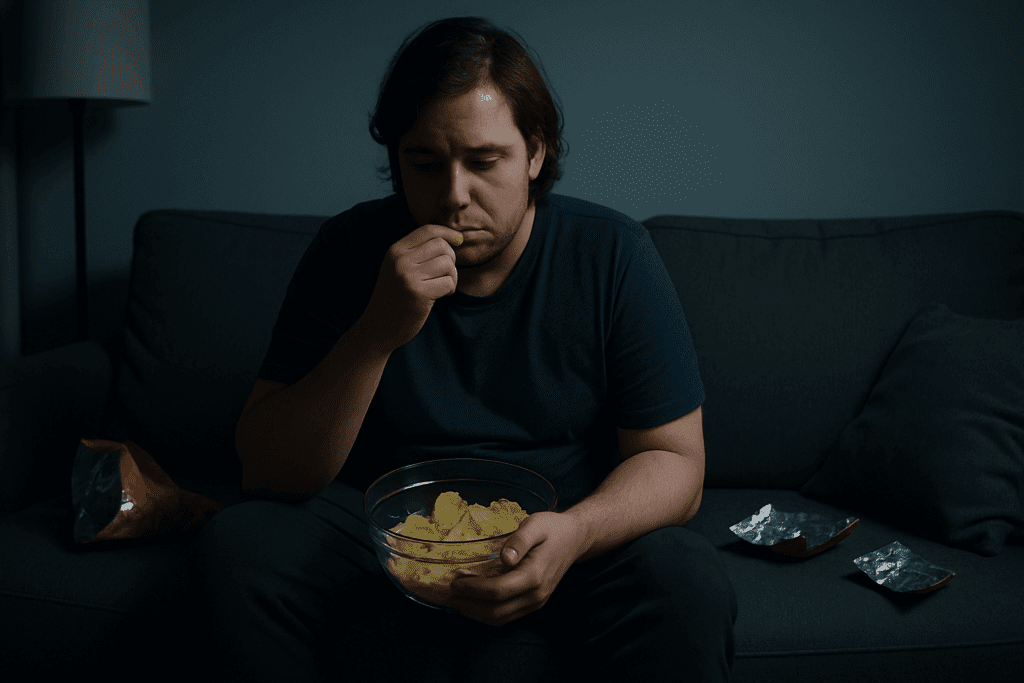
Emotional Eating and the Role of Internalized Shame
Emotional eating is often misunderstood as a simple lack of willpower. In reality, it is a coping mechanism developed in response to emotional distress, psychological discomfort, or unmet needs. People who engage in emotional eating do not always do so because they’re hungry; they eat to soothe feelings of sadness, anger, boredom, or even loneliness. However, what follows is often not relief but regret. It’s common for people to feel guilty after eating in these scenarios, especially if they consumed foods they were trying to avoid or ate beyond the point of physical fullness.
The connection between food and emotion is deeply ingrained, sometimes starting in childhood when sweets were given as rewards or comfort during difficult times. As we grow older, those patterns often remain intact. When emotions become overwhelming and there are few outlets for processing them, food becomes a stand-in for self-soothing. Unfortunately, while the act of eating may temporarily mask discomfort, it rarely addresses the root of the issue. In fact, it can add another layer of emotional burden.
This is where the concept of internalized shame enters the picture. Feeling guilty after eating often carries an implicit message: “I’ve done something wrong.” But when that feeling evolves into “I am wrong,” it morphs into shame—a much deeper and more corrosive emotion. Shame is isolating and often leads to secrecy and further disordered behavior around food. Recognizing the difference between situational guilt and chronic shame is an important step in reclaiming a healthier narrative around eating.
How Diet Culture Fuels the Cycle of Guilt and Discomfort
Diet culture thrives on the promise of transformation and control. It often markets itself as a path to wellness, but its underlying messages can be harmful and counterproductive. The pervasive idea that thinness equates to health, or that certain foods must be avoided at all costs, fuels feelings of inadequacy and shame when those ideals aren’t met. Diet culture tends to moralize food choices—labeling them as “clean,” “cheat,” or “junk”—which reinforces the idea that eating is a test of character.
For individuals trying to recover from chronic dieting or disordered eating, navigating a world saturated with these messages can feel impossible. Even well-meaning advice like “watch your portions” or “avoid carbs” can trigger guilt, especially for those who have internalized the idea that eating less is inherently better. When someone repeatedly feels guilty after eating, especially in social or celebratory contexts, it often reflects the influence of these external pressures.
Ironically, diet culture rarely delivers the long-term results it promises. Studies show that restrictive dieting is not only ineffective in sustaining weight loss but also associated with increased weight cycling, metabolic disruption, and psychological distress. The backlash against perceived dietary failure often manifests in episodes of overeating or bingeing, which then further amplify feelings of guilt. This pattern reinforces the question: Why do I feel bad after I eat, even when I’m trying to be “good”? The answer often lies in the unrealistic and harmful standards that diet culture imposes.

Navigating Physical Discomfort After Eating
In some cases, the discomfort that follows eating is more physical than emotional—but it’s no less significant. Individuals who frequently feel bloated, sluggish, or nauseous after meals may be dealing with undiagnosed digestive issues. Conditions such as irritable bowel syndrome (IBS), food intolerances, and functional dyspepsia can cause discomfort that is wrongly interpreted as emotional distress or even guilt. This can blur the lines between physiological and psychological reactions, making it harder to identify the root cause.
For instance, someone might regularly feel bad after eating due to lactose intolerance or gluten sensitivity, but because these symptoms are subtle or intermittent, they might be overlooked. When the individual also has a complicated emotional relationship with food, they may assume the discomfort is their fault—yet another example of food guilt masquerading as a digestive issue. Consulting with a medical professional to rule out physical causes is an essential step, particularly when symptoms are persistent.
Moreover, the pace at which someone eats, their hydration levels, and even their posture can affect how their body processes food. Eating too quickly, while distracted, or in a state of stress can hinder digestion and contribute to discomfort. Creating mindful rituals around mealtime—such as taking deep breaths before eating, chewing thoroughly, and minimizing distractions—can significantly improve the physical experience of eating. When the body is treated with care, it becomes easier to disentangle emotional discomfort from physical sensations.
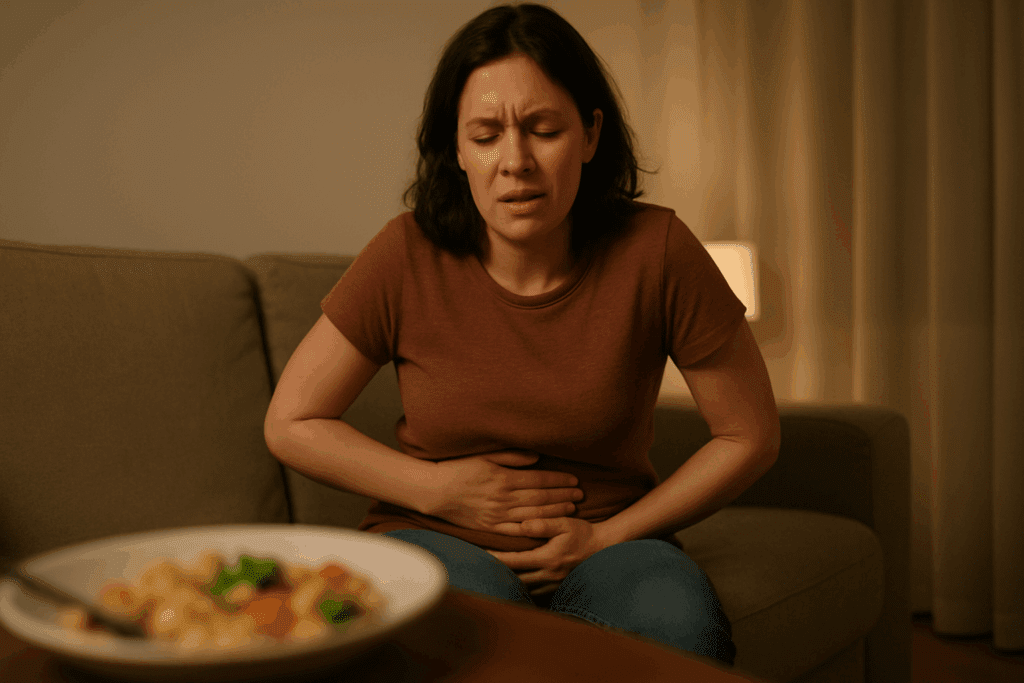
Breaking the Cycle: How to Rebuild a Healthy Relationship with Food
Overcoming food guilt and post-meal discomfort requires more than willpower; it demands a fundamental shift in perspective. One of the most effective starting points is practicing self-compassion. Instead of viewing food choices as moral decisions, it helps to reframe them as acts of nourishment and self-care. This reframing takes time and often benefits from the support of therapists, dietitians, or health coaches who specialize in intuitive eating and eating disorder recovery.
Learning to recognize the difference between physical hunger and emotional hunger is also key. Keeping a journal of eating habits and emotions before and after meals can help illuminate patterns that may be influencing how you feel. Over time, this practice can foster greater awareness and make it easier to identify emotional triggers before they lead to distress. Equally important is the ability to sit with discomfort without judgment. Sometimes, feelings of guilt or nausea are signs that deeper healing is needed, and that’s okay.
Creating a supportive food environment can also help reduce feelings of guilt after eating. This might involve setting boundaries with people who reinforce diet culture, curating your social media feed to include body-positive voices, or learning to prepare meals that are both nourishing and enjoyable. The goal is not perfection but consistency in treating yourself with respect and curiosity. Reconnecting with the pleasure of eating—without shame—can transform not only your meals but your overall well-being.
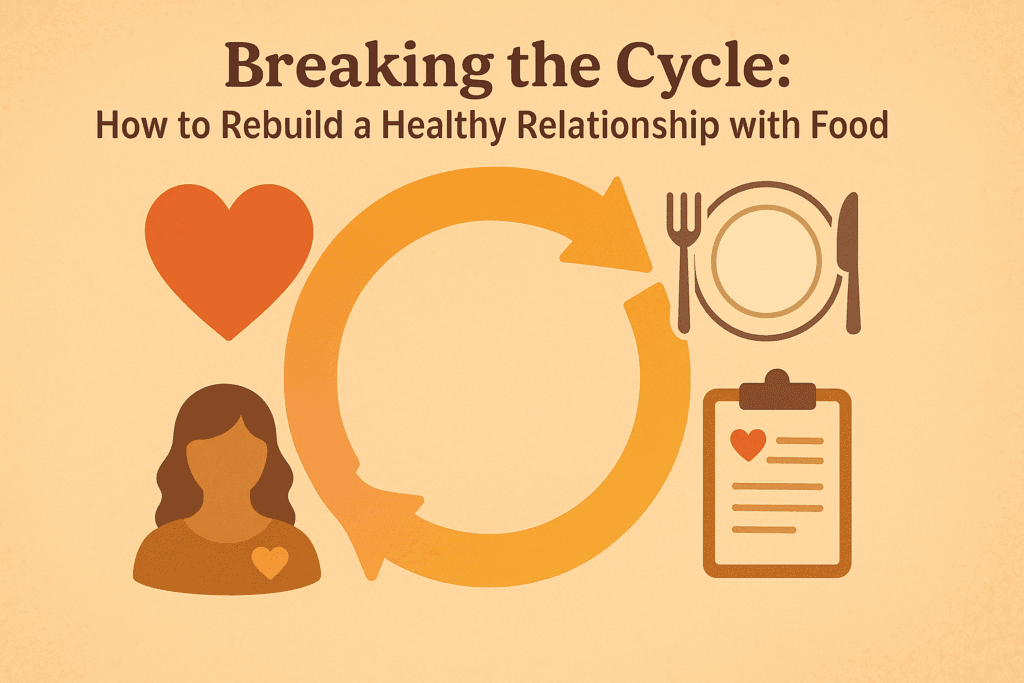
Why Understanding Emotional Triggers Matters
To truly address the question of why you feel bad after you eat, it’s essential to understand the emotional triggers that precede and follow meals. Emotions are not random; they are often tied to past experiences, beliefs, or unspoken needs. For instance, someone who grew up in an environment where food was scarce or conditional may associate eating with anxiety or guilt. Others may have learned to suppress emotions and turn to food as a means of emotional regulation.
Bringing these triggers into conscious awareness is an empowering step. It shifts the narrative from self-blame to self-inquiry. Rather than seeing yourself as someone who “lacks control,” you can begin to understand yourself as someone whose eating behaviors make sense in the context of your life story. This lens of compassion doesn’t excuse harmful behavior, but it does create space for healing. Therapy—especially approaches like cognitive behavioral therapy (CBT) or acceptance and commitment therapy (ACT)—can be particularly effective in addressing emotional eating patterns.
Incorporating mindfulness practices into your daily routine can also build emotional resilience. Techniques like body scans, guided meditation, or mindful eating exercises help you stay present and observe your thoughts without judgment. Over time, this mindfulness can interrupt the automatic loop of emotional eating, nausea, and guilt, allowing you to respond to your needs more skillfully. When you understand what drives your eating patterns, you’re better equipped to shift them in meaningful, lasting ways.
Frequently Asked Questions: Food Guilt, Post-Meal Discomfort, and Emotional Eating
Why do I feel emotionally drained or anxious after eating a meal I normally enjoy?
Feeling emotionally depleted after a meal that typically brings joy can be a sign of hidden food-related anxieties. Often, when individuals ask, “Why do I feel bad after I eat?” they’re not just referring to physical symptoms—they’re identifying subtle psychological tensions that emerge after eating. This may stem from conflicting beliefs about what is considered “healthy,” guilt tied to calorie counting, or previous episodes of judgment from others. People who grew up in households where food was tightly controlled or moralized may feel internal pressure to “earn” or “justify” enjoyable meals, leading to post-meal emotional exhaustion. Addressing the root cause of this internal conflict, often through therapy or guided mindfulness, can help reframe eating as a nurturing experience rather than a test of discipline.
What could it mean if I’m hungry but feel like throwing up when I eat?
When someone says they’re hungry but feel like throwing up when they eat, it’s important to examine both the emotional and physiological landscape. This paradox may be linked to underlying anxiety disorders, particularly those involving anticipatory worry or gastrointestinal hypersensitivity. Stress hormones like cortisol can inhibit digestion, leading to nausea or tightness in the stomach even when hunger cues are present. Additionally, certain patterns of trauma—especially those involving food insecurity or body image shaming—can manifest as nausea during eating. In these cases, nervous system regulation strategies, such as breathwork or vagal toning exercises, may help resolve the disconnect between hunger and appetite.
Is it normal to feel guilty after eating something that doesn’t align with my diet plan?
It is surprisingly common to feel guilty after eating foods that diverge from personal diet goals, but common doesn’t mean healthy. The real question isn’t just “Why do I feel guilty after eating?”—it’s “Where does that guilt come from?” Often, it originates from rigid rules imposed by diet culture or self-imposed expectations of perfection. People tend to internalize these standards so deeply that any perceived deviation, even a minor one, is met with disproportionate self-criticism. Recognizing this as a learned response—and not a reflection of actual wrongdoing—is a vital step toward self-liberation from chronic food guilt.
Why do I feel bad after I eat even when the food is nutritious?
Many people associate discomfort after eating with poor food choices, but feeling bad after eating something healthy often indicates a deeper psychological conflict. This could stem from internalized pressure to meet unrealistic body standards or a history of disordered eating where even nourishing meals trigger stress. For those wondering, “Why do I feel bad after I eat when I know it was a good meal?” the issue may lie in an unconscious association between eating and perceived loss of control. Another possibility is that the act of eating, regardless of nutritional value, activates a stress response due to unresolved emotional patterns. Therapeutic approaches that decouple food intake from moral judgment can be transformative.
How can social media impact food guilt and post-meal regret?
The curated world of social media plays a powerful role in reinforcing food guilt, often through idealized portrayals of “clean eating” or body transformation. Constant exposure to highly edited images and self-proclaimed nutrition experts can distort a person’s perception of what constitutes a normal meal. For someone already prone to feeling guilty after eating, these messages act as triggers, deepening shame and self-criticism. Social media also tends to oversimplify complex health issues, making it easier to internalize harmful messages about food and body image. A digital detox or following accounts that promote body neutrality and intuitive eating can help reduce this form of guilt-inducing content.
Are there biological reasons why someone might feel bad after eating?
Absolutely—while emotions play a role, biology should not be overlooked. Digestive issues such as lactose intolerance, small intestinal bacterial overgrowth (SIBO), or food sensitivities can cause a range of symptoms like bloating, fatigue, or irritability after meals. For someone asking, “Why do I feel bad after I eat?” and noticing patterns regardless of food type, it may be worthwhile to consult a healthcare provider for gastrointestinal testing. Blood sugar fluctuations are another common culprit; eating high-glycemic meals can lead to a quick energy spike followed by a crash, which affects both mood and physical state. Managing these conditions often requires personalized medical support in tandem with emotional healing.
Can trauma influence the experience of feeling guilty after eating?
Yes, trauma can significantly impact how one feels about food, often in subconscious ways. Many individuals who have survived emotional or physical trauma develop a conflicted relationship with nourishment, associating eating with vulnerability, control, or punishment. For those who often wonder, “Why do I feel guilty after eating even when I was genuinely hungry?” unresolved trauma might be influencing their inner narrative. This is especially true if food was used as a reward, punishment, or withheld in childhood. Working with a trauma-informed therapist can uncover these associations and facilitate a safer, more compassionate approach to eating.
How can someone distinguish between true hunger and emotional hunger?
Understanding the difference between physical hunger and emotional hunger is essential for resolving issues like food guilt and discomfort. Physical hunger builds gradually and can be satisfied by a variety of foods, while emotional hunger arises suddenly and is often specific to comfort foods or cravings. People who ask, “Why do I feel guilty after eating when I was hungry?” may actually be reacting to emotional hunger cues that mimic physical ones. One technique for clarity is to pause and check in with the body before eating—asking questions like, “What am I feeling emotionally?” and “Would a simple, balanced meal satisfy me right now?” Developing this awareness helps reduce reactive eating and the guilt that often follows.
What are some long-term effects of consistently ignoring food guilt?
Suppressing feelings of food guilt doesn’t make them disappear—it typically causes them to resurface in more disruptive ways. Over time, persistent guilt can lead to chronic stress, increased cortisol levels, and even metabolic disruption. It can also damage self-esteem and contribute to the development of disordered eating patterns, including binge-restrict cycles. When someone repeatedly brushes off the question, “Why do I feel guilty after eating?” without exploring it, they miss the opportunity to understand their deeper emotional needs. Long-term healing involves not just ignoring guilt but actively working to dismantle the beliefs that generate it in the first place.
Why do I feel bad after I eat when I’m around certain people or in social situations?
Social settings often introduce layers of pressure, judgment, or comparison that can significantly alter the eating experience. Many people feel bad after they eat not because of the food itself, but because of the emotional dynamics present during the meal. If someone regularly feels guilty after eating in public or with family, it may indicate a fear of being scrutinized or judged for their choices. Cultural norms, critical comments, or witnessing others eat differently can all contribute to this discomfort. Creating boundaries and choosing supportive environments can help reduce these social triggers and make eating a more relaxed experience.
Conclusion: Reclaiming Peace With Food by Listening to Your Body and Emotions
If you’ve ever wondered, “Why do I feel bad after I eat?” the answer is not simple—but it is deeply meaningful. Whether you’re battling food guilt, struggling with feeling guilty after eating, or facing the strange sensation of being hungry but feeling like throwing up when you eat, you’re not alone. These experiences are reflections of a complex interplay between body, mind, and emotion. They are also deeply human.
Rebuilding a peaceful, trusting relationship with food requires more than cutting out sugar or counting macros. It involves turning inward, questioning the stories you’ve inherited about food and your body, and learning to meet yourself with empathy rather than judgment. Healing doesn’t happen overnight, but it is absolutely possible with the right tools, support, and mindset. Remember that food is not the enemy—shame, fear, and disconnection are. By cultivating curiosity, practicing self-compassion, and seeking guidance when needed, you can learn to eat in a way that feels nourishing, joyful, and free from guilt.
Ultimately, understanding your unique relationship with food is a journey worth taking. It holds the promise not only of better digestion or fewer moments of regret, but of a deeper connection to yourself and a richer, more satisfying life overall.
Was this article helpful? Don’t let it stop with you. Share it right now with someone who needs to see it—whether it’s a friend, a colleague, or your whole network. And if staying ahead on this topic matters to you, subscribe to this publication for the most up-to-date information. You’ll get the latest insights delivered straight to you—no searching, no missing out.

